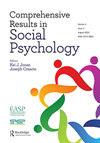The Replicability Crisis and Public Trust in Psychological Science
引用次数: 58
Abstract
Replication failures of past findings in several scientific disciplines, including psychology, medicine, and experimental economics, have created a ‘crisis of confidence’ among scientists. Psychological science has been at the forefront of tackling these issues, with discussions about replication failures and scientific self-criticisms of questionable research practices (QRPs) increasingly taking place in public forums. How this replicability crisis impacts the public’s trust is a question yet to be answered by research. Whereas some researchers believe that the public’s trust will be positively impacted or maintained, others believe trust will be diminished. Because it is our field of expertise, we focus on trust in psychological science. We performed a study testing how public trust in past and future psychological research would be impacted by being informed about i) replication failures, ii) replication failures and criticisms of QRPs, and iii) replication failures, criticisms of QRPs, and proposed reforms. Results from a mostly European sample (N = 1129) showed that, compared to a control group, whereas trust in past research was reduced when people were informed about the aspects of the replication crisis, trust in future research was maintained except when they were also informed about proposed reforms. Potential explanations are discussed.心理科学中的可复制性危机与公众信任
在包括心理学、医学和实验经济学在内的几个科学学科中,重复过去发现的失败已经在科学家中造成了“信任危机”。心理科学一直处于解决这些问题的前沿,关于复制失败的讨论和对可疑研究实践的科学自我批评(qrp)越来越多地出现在公共论坛上。这种可复制性危机如何影响公众的信任,这是一个有待研究回答的问题。一些研究人员认为公众的信任将会受到积极的影响或保持,而另一些人则认为信任将会减少。因为这是我们的专业领域,我们在心理科学中关注信任。我们进行了一项研究,测试公众对过去和未来心理学研究的信任如何受到以下信息的影响:1)重复失败,2)重复失败和对qrp的批评,以及3)重复失败,对qrp的批评和建议的改革。主要来自欧洲的样本(N = 1129)的结果表明,与对照组相比,当人们被告知重复性危机的各个方面时,对过去研究的信任度降低,但对未来研究的信任度保持不变,除非他们也被告知拟议的改革。讨论了可能的解释。
本文章由计算机程序翻译,如有差异,请以英文原文为准。
求助全文
约1分钟内获得全文
求助全文
来源期刊

Comprehensive Results in Social Psychology
Psychology-Social Psychology
CiteScore
3.40
自引率
0.00%
发文量
7
 求助内容:
求助内容: 应助结果提醒方式:
应助结果提醒方式:


